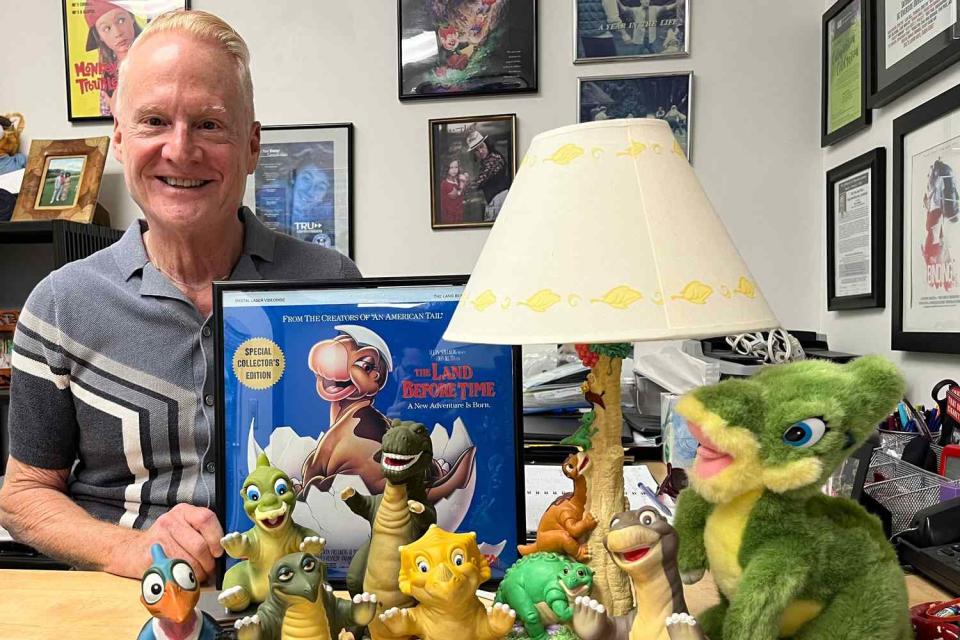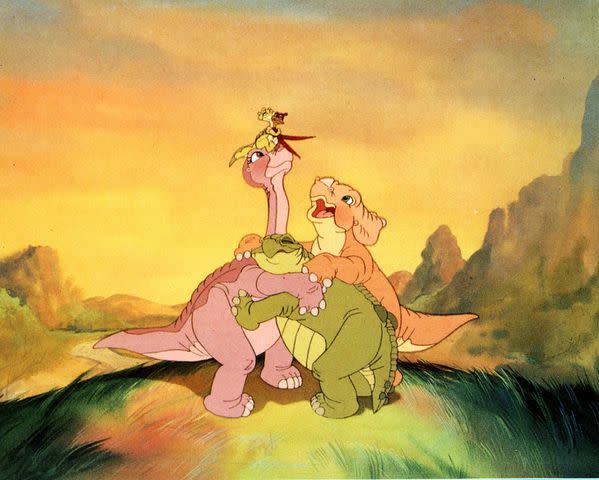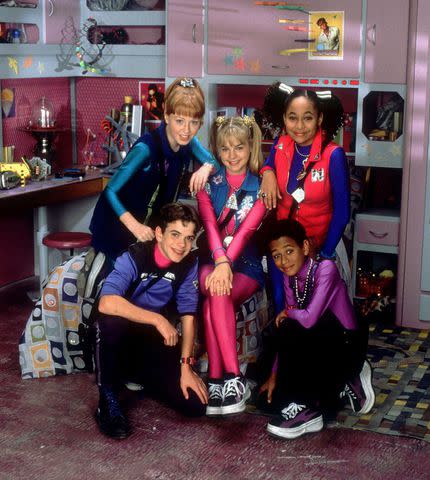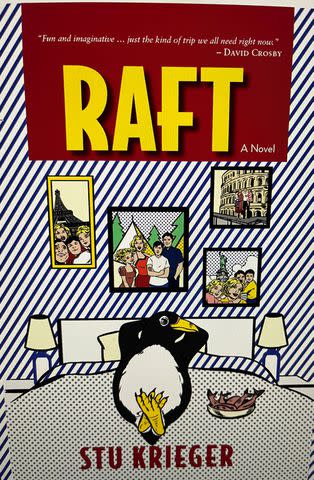“The Land Before Time” and “Zenon” Writer Stu Krieger on Reimagining the Prehistoric Past and Technological Future (Exclusive)
"I would rather have a kid turn to their mom and go, ‘What does that mean?’ than feel like we’re talking down to them," the screenwriter and author tells PEOPLE

Courtesy of Stu Krieger
Stu KriegerMore than three-and-a-half decades since The Land Before Time premiered in theaters, chances are you can simply say “Yup! Yup! Yup!” to most millennials, and they’ll immediately recognize Ducky’s catchphrase from the beloved 1988 animated film about five baby dinosaurs navigating a perilous journey through a prehistoric landscape. That’s how deeply embedded the film, directed by famed animator Don Bluth, and its characters are in the psyches of people who grew up in the late ’80s and early ’90s.
The film’s writer, Stu Krieger, is well aware of its legacy, and how could he not be? “At least once or twice a quarter, some [student] would kinda timidly poke their head in my office and say, ‘I just wanted to say hi because, dude, you wrote my childhood!’ ” the author and screenwriter tells PEOPLE of his early days teaching screen and television writing at the University of California, Riverside. “When I started hearing that, it was so touching.”
On social media, where he routinely posts video clips looking back on The Land Before Time and other films and TV shows he’s worked on over his long career, Krieger says he frequently gets comments from fans fondly ribbing him over the film’s emotional impact.
“ ‘So you’re the reason for my childhood trauma when you killed Littlefoot’s mom!’ ” he quotes one such comment.

Alamy
The characters in 1988's 'The Land Before Time'Challenging young viewers, while entertaining them at the same time, was a goal Krieger shared with The Land Before Time’s executive producers Steven Spielberg and George Lucas — and one that has been part of all of his work for children.
“When I started to have my own children, I was taking them to see things and going, ‘You know, family entertainment doesn’t have to be this dumb!’ ” he recalls. “I would rather have a kid turn to their mom and go, ‘What does that mean?’ than feel like we’re talking down to them. I think kids are much more intelligent than we give them credit for.”
Related: Teen Shows of the '90s You May Have Forgotten About
A touchstone for Spielberg in early discussions about the project was the pivotal moment in Disney’s Bambi when the title character’s mother is killed. “The death of Bambi’s mom, for him when he was growing up, was so impactful because it was the first introduction to death and the concept of something you’re going to have to deal with at some point in your life,” Krieger says. “So, we had this discussion about, you know, even though it was difficult, it was an important lesson and maybe we should incorporate that into this story as well.”
(So, for the record, it was Steven Spielberg’s idea to kill Littlefoot’s mom. Blame him for your childhood trauma.)
Another major theme that emerged was diversity — how a group of disparate characters from different backgrounds could not just learn to get along, but come to depend upon one another and become invested in each other’s wellbeing despite their differences.
“ ‘Three-horns never play with long-necks,’ all that stuff that was so important to the themes of the movie, my job really was: How do we individuate and differentiate these characters so they have personalities that kids are going to engage with and care about?” Krieger explains. “Cera’s stubbornness being a Triceratops, butting heads with her horns; that made sense for her personality. And Littlefoot was kind of the gentle giant of the group. So, it was kind of pairing the personalities with the type of dinosaurs they were. Crafting the personalities to fit the models.”

UCR/Stan Lim
Stu KriegerClearly, both the characters Krieger helped create and the themes he incorporated into The Land Before Time resonated with a generation of kids. The film spawned more than a dozen direct-to-video sequels and a two-season animated series on the Cartoon Network. But Krieger, who had first right of refusal to write the first two sequels, declined.
“When The Land Before Time II and III were going to happen, I had a meeting at Universal and they said, ‘They’re going to be direct-to-video, they’re going to be much cheaper, Spielberg and Lucas aren’t going to be involved.’ And I said, ‘I very much appreciate the meeting, I’m gonna pass.’ Because I would rather be the guy that created the franchise with the theatrical Spielberg/Lucas version than the cheap-ass reductive versions that followed,” he explains. “So, I was not involved with anything after the original, but that was a very conscious creative choice, just wanting to move forward with my career.”
Krieger did go on to create another indelible character that he would revisit more than once in the 1999 Disney Channel original movie Zenon: Girl of the 21st Century and its two sequels.

Alamy
Kirsten Storms (center), Raven-Symone (upper right) and the cast of 1999's 'Zenon: Girl of the 21st Century'Whereas The Land Before Time imagined a prehistoric past, for the Zenon movies Krieger cast his creative eye toward the future. To this day, he says, fans and podcasters ask how he anticipated things like the iPad (Zap Pads in Zenon) and virtual assistants (embodied in Katey Sagal’s PAT in 1999's Smart House). For both movies, Krieger spent two days at the Jet Propulsion Laboratory in Pasadena, California, meeting with scientists to help come up with the tech in both films.
Related: PEOPLE Staffers Pick the Best Disney Channel Original Movies
But he also thought about how technology would realistically progress in the 21st century. “A lot of times with sci-fi, they make these tremendous leaps in a short amount of years, so suddenly we’re all in flying cars and aluminum space suits,” he explains. “So, I went back 50 years and men are still dressed in suits to go to work. Things change but they’re not these giant changes. So, if I’m going 50 years in the future, I’m using that measure.”
Krieger’s vision of the future in Zenon and his vision of the distant past in The Land Before Time both share something in common with all of his work. “If you look over all the movies I did for the Disney Channel and everything else, for me it’s always about: Who are these characters? What are the relationships?” says Krieger, who describes himself as a hopeless optimist. “If you look at the entire canon of my work, if there’s a recurring thread even in the adult projects, it’s really about that: family and human connections and, to quote Huey Lewis, the power of love.”

Warren Publishing
Stu Krieger's latest novel, 'Raft'Never miss a story — sign up for PEOPLE's free daily newsletter to stay up-to-date on the best of what PEOPLE has to offer, from celebrity news to compelling human interest stories.
It's a thread that continues in his latest novel, Raft, the story of children’s book author Clark Whitaker who, in the throes of a midlife crisis, finds himself inexplicably transformed into a penguin. The novel, Krieger’s second, follows Whitaker, his wife and kids as they try to unravel the mystery of his transformation and sort out their lives and relationships.
Krieger says the most common response to the novel since it was published last year has been “I laughed all the way through and cried at the end” — a reaction that’s not dissimilar to those had by millions of people who saw The Land Before Time as kids.
“When I read that,” Krieger says, “it’s like, ‘Alright, I did my job.’ ”
For more People news, make sure to sign up for our newsletter!
Read the original article on People.


